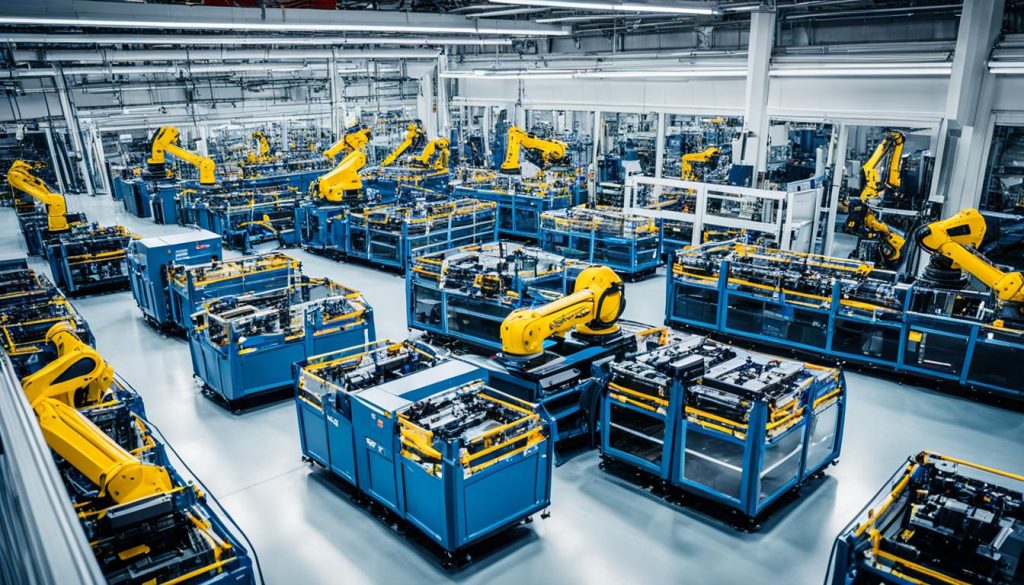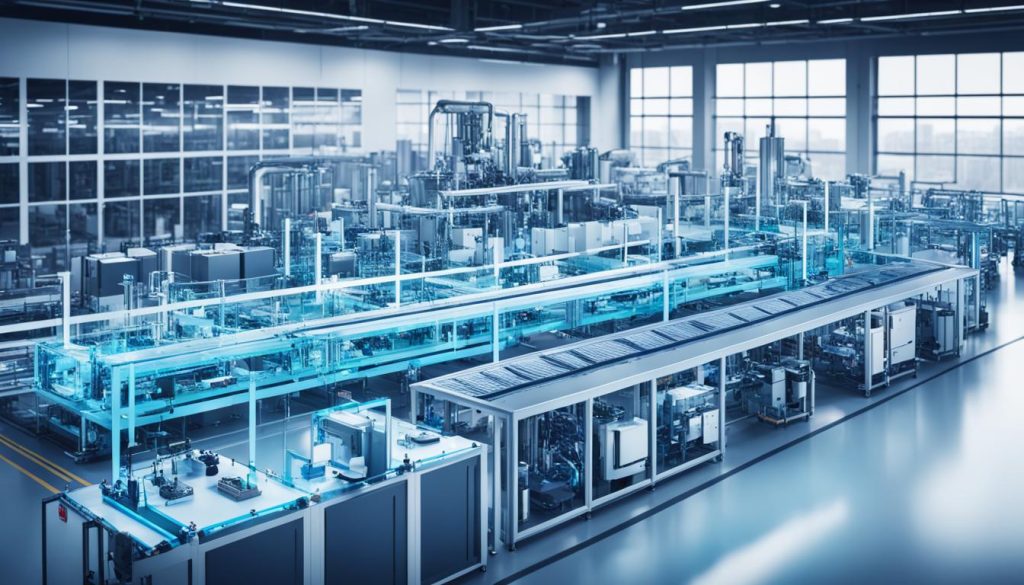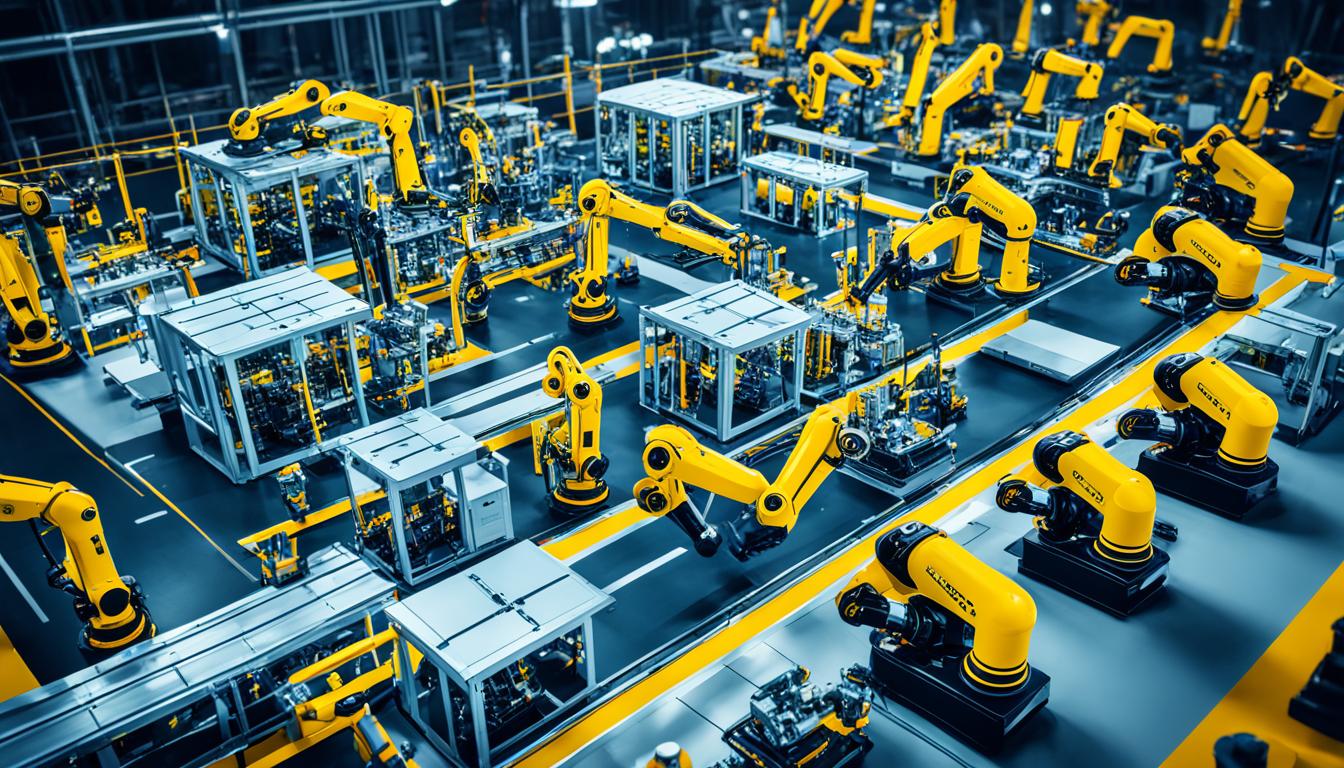The manufacturing landscape is undergoing an extraordinary metamorphosis, fueled by the breakthroughs of Industry 4.0 and the relentless pursuit of digital transformation in manufacturing. This evolution is not just about technological advancement; it’s about reshaping the very fabric of how industries operate. As you dive into this transformative era, you will witness the rise of smart factories—hubs of automation and data-driven processes that dramatically enhance efficiencies and production prowess.
Moreover, this revolution transcends mere productivity increments; it’s about erecting the pillars for a sustainable future. Sustainable manufacturing solutions are ensuring that the strides we make today don’t come at the expense of tomorrow’s resources. Your understanding of these titanic shifts sets the stage for exploring the intricate and revolutionary innovations that are making smart, sustainable manufacturing a reality.
Key Takeaways
- Industry 4.0 signifies a paradigm shift towards advanced, digitally-transformed manufacturing processes.
- Smart factories are at the forefront of this transformation, offering automation and intelligent, data-driven operations.
- The integration of sustainable manufacturing solutions is crucial for ensuring the longevity and responsibility of the industry’s growth.
- Recognizing these changes is vital for anyone involved in or impacted by the manufacturing sector.
- Industry 4.0 is not a future concept; it’s a present reality that’s reshaping the global manufacturing landscape.
Understanding the Shift Towards Advanced Manufacturing Technologies
As the manufacturing industry looks to the horizon, a significant transformation is underway, marked by the integration of cutting-edge technologies such as AI in manufacturing, machine learning applications, additive manufacturing advancements, along with the strides in robotics and automation. Let’s delve into how these innovations are redefining the production landscape.
The Role of AI and Machine Learning
Artificial intelligence and machine learning are the vanguards of industry evolution, bringing about a new era where systems can anticipate maintenance needs, optimize production workflows, and customize outputs on-demand. By harnessing vast amounts of data, AI in manufacturing is transitioning from a futuristic concept to an indispensable tool for decisions that drive efficiency and cost reduction.
3D Printing and Additive Manufacturing Advancements
In the realm of product development and prototyping, nothing compares to the versatility offered by 3D printing technology and additive manufacturing. These processes not only accelerate the creation of prototypes but also empower designers with the ability to iterate rapidly, minimizing the time from concept to market. Moreover, they represent a significant step towards sustainability by minimizing waste through layer-by-layer construction.
Enhancing Processes Through Robotics and Automation
Robotics and automation have long been associated with manufacturing, but recent advancements enable these technologies to conduct sophisticated tasks with precision and without fatigue. These automated systems are not just revolutionizing production lines but also enhancing safety, allowing human workers to focus on less repetitive and more strategic activities.
| Technology | Impact on Manufacturing | Key Benefits |
|---|---|---|
| AI & Machine Learning | Real-time data analysis and predictive maintenance | Increased efficiency, reduced downtime |
| 3D Printing | Customization and rapid prototyping | Flexibility in design, reduced waste |
| Robotics & Automation | Continuous and precision-oriented production | Enhanced safety, consistent quality |
Your understanding of these advanced manufacturing technologies is crucial to navigating the industrial landscape of tomorrow. Whether you are a stakeholder, an investor, or an enthusiast, recognizing their contribution to the modern manufacturing process is essential for grasping the future of production.
The Emergence of Smart Factories and Their Impact
As we delve deeper into the realm of Industry 4.0, the smart factory technology emerges as a pivotal axis around which the future of manufacturing rotates. These advanced facilities are harbingers of a significant shift in industrial practices, signaling an era marked by automated production processes and a digital upswing.
In these establishments, every piece of machinery, every sensor, and every production line is woven into an intricate digital network. This network fosters an environment of real-time communication and a seamless digital transformation in manufacturing. Smart factories are not mere clusters of machines but intelligent entities capable of self-diagnosis and optimization, built upon the key principles of automation and constant connectivity.

This transformation equips manufacturers with the ability to monitor, analyze, and automate their operations like never before. With the advent of smart factory technology, industries can look forward to enhancements in efficiency, production throughput, and flexibility in manufacturing operations.
Smart factories bridge the gap between physical production and digital technology, opening a new chapter of industrialization that is lean, efficient, and cyber-secure.
Let’s explore the opportunities these factories present:
- Enhanced efficiency through streamlined and optimized processes
- Greater product quality and reliability
- Reductions in operational downtimes and maintenance costs
- Improved safety conditions for the workforce
- Flexibility to adapt to changing market demands and production customization
However, the shift does bring forth challenges that cannot be ignored:
- Integration of digital literacy among the workforce is essential, creating a need for re-skilling and up-skilling initiatives
- Cybersecurity threats require robust protections as the cost of potential breaches can be substantial
- Substantial initial investment in infrastructure and technology is needed to transition to smart manufacturing
The following table illustrates a comparative snapshot of traditional versus smart factories:
| Aspect | Traditional Factories | Smart Factories |
|---|---|---|
| Data Management | Manual record keeping and reactive responses | Real-time data analytics and proactive optimization |
| Maintenance | Periodic and prescribed | Predictive and condition-based |
| Production Flexibility | Fixed and inflexible production lines | Modular and easily reconfigurable systems |
| Customization | Standardized mass production | Highly tailored production catering to specific demands |
| Worker Involvement | Manual intensive tasks | High-level monitoring and strategic decision-making |
As we can observe, the smart factory is not just an evolution in terms of technology; it represents a profound redefinition of manufacturing paradigms. By embracing the principles of Industry 4.0 and nurturing the growth of automated production processes, the industry can ensure a robust, scalable, and sustainable future for manufacturing.
Driving Forces Behind Digital Transformation in Manufacturing
This era of industrial evolution signifies a monumental shift towards smarter, more connected manufacturing landscapes. The forces propelling this digital transformation in manufacturing are multifaceted, deeply interwoven with the fabric of technological progress. From the shop floor to the executive suite, every facet of the industry is being enhanced by innovations such as IoT in Industry 4.0, big data analytics, and cloud computing.
The integration of advanced technologies has initiated a fundamental reassessment of how manufacturing efficiency is conceptualized and achieved. It’s not just about quicker processes, but smarter, data-driven decisions that escalate production efficacy to unprecedented levels. Here, we chart out those transformational forces and capture their essence as the keystones for efficient production processes.

Integration of IoT in Industrial Settings
Embracing the Internet of Things (IoT) within Industry 4.0 is akin to outfitting manufacturing with an intricate nervous system. Sensors and smart devices collect a continuous stream of data from equipment and processes, lending a previously unimaginable visibility into every operational nuance. This enhanced transparency is the bloodstream of optimal performance, enabling predictive maintenance and personalized production methodologies.
Big Data Analytics for Improved Efficiency
When it comes to harnessing the power of data, big data analytics stands out as a critical process. As IoT devices spew vast amounts of information, big data systems are the masterminds turning this raw data into actionable insights. Manufacturers who adeptly analyze their data can fine-tune their production processes, reduce downtime, and elevate their output quality by identifying patterns and predicting outcomes.
Cloud Computing’s Role in Process Optimization
Cloud computing in manufacturing is the pillar that supports the colossal data demands of a digitized industrial environment. With its scalable nature, cloud resources are being leveraged for expansive data storage, potent computing capabilities, and superior analytical horsepower. Whether it’s through facilitating collaborative innovation or ensuring a nimble response to market demands, cloud solutions are indispensable in achieving a seamless, efficient production process.
The Principles and Implementation of Lean Manufacturing Practices
In the dynamic arena of modern production, lean manufacturing practices offer a strategic edge by focusing on generating maximum value while expending minimum resources. By adopting these methodologies, your company can enhance operational efficiency, leading not only to reduced costs but also to a robust, sustainable manufacturing framework. As you navigate the competitive landscape, implementing these enduring principles will position your brand at the forefront of the industry’s future.
Waste Reduction Strategies
The core of lean manufacturing is anchored in waste reduction strategies. By identifying and eliminating non-value-adding activities, your firm can ensure that every process step fortifies the foundation for a more streamlined workflow. This lean approach fosters not just a one-time change but a perpetual culture of conservation within the organization, advocating the responsible use of materials and resources, thus aligning with today’s sustainable manufacturing solutions imperative.
Continuous Improvement Processes
Moreover, the philosophy of continuous improvement propels organizations to relentlessly pursue excellence. These processes demand that you persistently scrutinize and refine production techniques, thereby ingraining an inclination for progressive evolution in the corporate ethos. It’s through this vigilant cycle of evaluation and optimization that lean manufacturing translates into real-world efficiencies and an enduring competitive advantage.
FAQ
What does Industry 4.0 mean for manufacturing?
Industry 4.0 refers to the next wave of the industrial revolution focused on smart and automated manufacturing. It represents the digital transformation in manufacturing where factories become more data-driven, connected, and efficient through the application of technologies like the Internet of Things (IoT), artificial intelligence (AI), robotics, and cloud computing.
How are sustainable manufacturing solutions integrated into modern manufacturing?
Sustainable manufacturing solutions are integrated through the use of renewable energy sources, materials recycling, energy-efficient technologies, and eco-friendly production processes. The goal is to minimize environmental impact while maintaining productivity and profitability.
How are AI and machine learning applied in manufacturing?
AI and machine learning are applied in manufacturing for predictive maintenance, quality control, supply chain optimization, and demand forecasting. These technologies help in processing large amounts of data to make informed decisions that improve efficiency and reduce downtime.
What are the benefits of 3D printing in manufacturing?
3D printing, also known as additive manufacturing, offers benefits such as reduced material waste, lower production costs, the ability to create complex geometries, rapid prototyping, and customization of products according to specific customer needs.
In what ways do robotics and automation enhance manufacturing processes?
Robotics and automation enhance manufacturing processes by improving the precision of tasks, increasing production speed, reducing the incidence of errors and accidents, providing consistent quality, and performing dangerous or repetitive tasks that are unsuitable for human workers.
What is a smart factory and what impact does it have on manufacturing?
A smart factory is a highly digitalized and connected production facility that uses smart manufacturing techniques to enhance the production process. It impacts manufacturing by boosting efficiency, quality, and flexibility while reducing costs through automation, real-time data analysis, and self-optimization of operations.
How do automated production processes contribute to smart factories?
Automated production processes contribute to smart factories by allowing them to operate with minimal human intervention. The use of machines and algorithms improves production throughput, ensures consistent quality, and enables continuous operation, which, in turn, leads to improved scalability and adaptability.
What role does IoT play in Industry 4.0?
In Industry 4.0, IoT plays a foundational role by connecting machines, systems, and devices across the production floor. This connectivity allows for real-time data collection and analysis, enabling predictive maintenance, enhanced operational efficiency, and better supply chain management.
How does big data analytics improve manufacturing efficiency?
Big data analytics improves manufacturing efficiency by processing vast amounts of data to extract actionable insights. This leads to better decision-making, optimal resource allocation, faster turnaround times, and the ability to anticipate and respond to market demands with greater agility.
What is the significance of cloud computing in manufacturing?
Cloud computing plays a significant role in manufacturing by providing scalable storage, computing power, and advanced analytics capabilities. It facilitates collaboration across geographical borders, allows for more robust data management, and helps manufacturers quickly adapt to new technologies without significant upfront investments.
How do waste reduction strategies support lean manufacturing?
Waste reduction strategies support lean manufacturing by identifying and eliminating non-value-added activities. By streamlining processes, reducing defects, and optimizing the use of resources, manufacturers can decrease costs and improve overall efficiency, leading to a more sustainable and profitable operation.
What does continuous improvement entail in lean manufacturing?
In lean manufacturing, continuous improvement, or kaizen, entails an ongoing effort to improve all aspects of the manufacturing process. This can be achieved through regular analysis, feedback, employee involvement, and the willingness to make incremental changes that collectively enhance the overall performance and quality of production.







